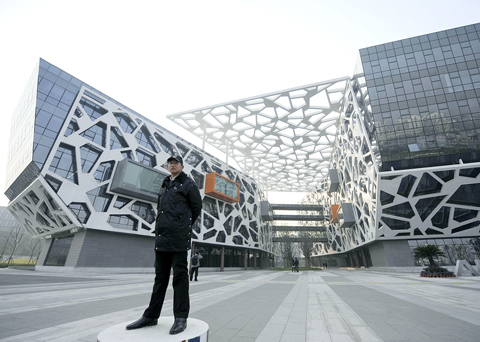China’s e-commerce giant Alibaba (阿里巴巴) yesterday condemned as “reckless” its partner Yahoo’s support of Google, which has threatened to pull out of the Asian nation over censorship and cyber attacks.
“Alibaba Group has communicated to Yahoo that Yahoo’s statement that it is ‘aligned’ with the position Google took last week was reckless given the lack of facts in evidence,” the firm’s spokesman John Spelich said in an e-mail.
“Alibaba doesn’t share this view,” he said.

PHOTO: REUTERS
Google announced on Tuesday that it would no longer censor search engine results in China and possibly leave the world’s largest online market, complaining about cyber attacks and censorship by the Chinese Communist Party regime.
China-based cyber spies struck the Internet giant and reportedly more than 30 other firms in an apparent bid for computer source codes, intellectual property and information about human rights activists around the world.
A spokeswoman for Yahoo, which owns 39 percent of Alibaba, on Wednesday welcomed Google’s decision.
“Yahoo is committed to protecting human rights and takes our users’ privacy and security very seriously,” the spokeswoman said.
“We condemn any attempts to infiltrate company networks to obtain user information,” he said.
“We stand aligned with Google that these kinds of attacks are deeply disturbing and strongly believe that the violation of user privacy is something that we as Internet pioneers must all oppose,” she said.
Alibaba controls Yahoo’s operations in China and also runs the nation’s top online auction site Taobao.com and business-to-business e-commerce platform Alibaba.com.
Chinese authorities regularly block content and Web sites they deem politically objectionable in a vast censorship system in a country with over 380 million online users.
Social networking site Facebook, Google’s video-sharing system YouTube and micro-blogging Web site Twitter are also blocked.

Conflict with Taiwan could leave China with “massive economic disruption, catastrophic military losses, significant social unrest, and devastating sanctions,” a US think tank said in a report released on Monday. The German Marshall Fund released a report titled If China Attacks Taiwan: The Consequences for China of “Minor Conflict” and “Major War” Scenarios. The report details the “massive” economic, military, social and international costs to China in the event of a minor conflict or major war with Taiwan, estimating that the Chinese People’s Liberation Army (PLA) could sustain losses of more than half of its active-duty ground forces, including 100,000 troops. Understanding Chinese

The Ministry of Foreign Affairs (MOFA) yesterday said it is closely monitoring developments in Venezuela, and would continue to cooperate with democratic allies and work together for regional and global security, stability, and prosperity. The remarks came after the US on Saturday launched a series of airstrikes in Venezuela and kidnapped Venezuelan President Nicolas Maduro, who was later flown to New York along with his wife. The pair face US charges related to drug trafficking and alleged cooperation with gangs designated as terrorist organizations. Maduro has denied the allegations. The ministry said that it is closely monitoring the political and economic situation

UNRELENTING: China attempted cyberattacks on Taiwan’s critical infrastructure 2.63 million times per day last year, up from 1.23 million in 2023, the NSB said China’s cyberarmy has long engaged in cyberattacks against Taiwan’s critical infrastructure, employing diverse and evolving tactics, the National Security Bureau (NSB) said yesterday, adding that cyberattacks on critical energy infrastructure last year increased 10-fold compared with the previous year. The NSB yesterday released a report titled Analysis on China’s Cyber Threats to Taiwan’s Critical Infrastructure in 2025, outlining the number of cyberattacks, major tactics and hacker groups. Taiwan’s national intelligence community identified a large number of cybersecurity incidents last year, the bureau said in a statement. China’s cyberarmy last year launched an average of 2.63 million intrusion attempts per day targeting Taiwan’s critical

AGING: As of last month, people aged 65 or older accounted for 20.06 percent of the total population and the number of couples who got married fell by 18,685 from 2024 Taiwan has surpassed South Korea as the country least willing to have children, with an annual crude birthrate of 4.62 per 1,000 people, Ministry of the Interior data showed yesterday. The nation was previously ranked the second-lowest country in terms of total fertility rate, or the average number of children a woman has in her lifetime. However, South Korea’s fertility rate began to recover from 2023, with total fertility rate rising from 0.72 and estimated to reach 0.82 to 0.85 by last year, and the crude birthrate projected at 6.7 per 1,000 people. Japan’s crude birthrate was projected to fall below six,